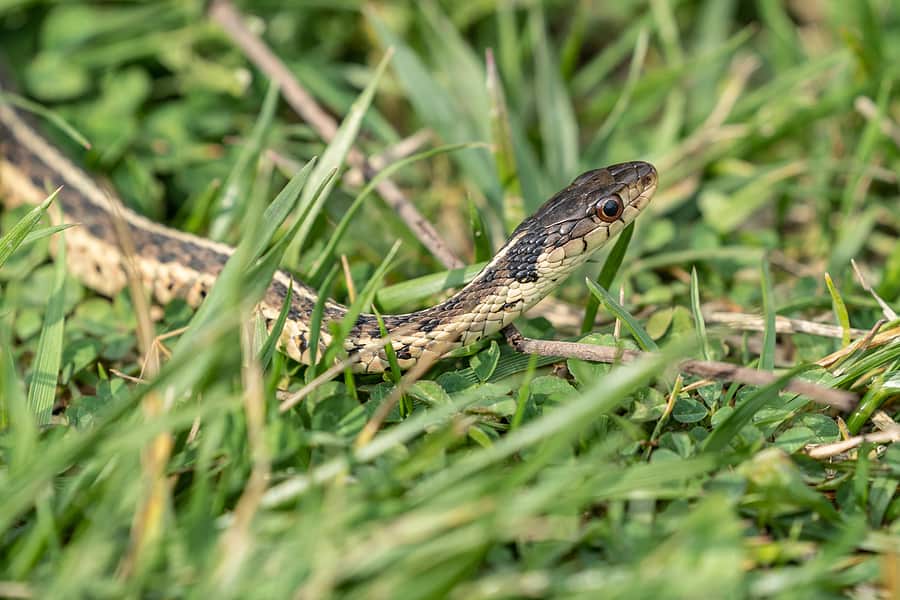READY TO GET STARTED?
REQUEST A FREE ESTIMATE
Fill out the form below or call (888) 466-7849 for a free, no-obligation estimate.

Warm weather means it’s the time of year when snakes are active, emerging in search of food and to bask in the sunlight for warmth. Although most snakes you encounter are nonvenomous, there are a few venomous snakes in Georgia. While many people may not enjoy running into a snake near their home, they can be quite beneficial to have around. Snakes eat other problematic pests that commonly infest your home, such as rodents, making them a natural form of pest control. If the thought of a snake sharing your space still makes you uneasy, try these DIY snake repellent methods to keep your yard snake free.
A frequent ingredient in many commercial snake repellent products is napthalene. It is one of the most widely used repellents. If you don’t want to buy a commercial product, napthalene is the major component of moth balls. The odor of napthalene annoys snakes but does not kill them. Mothballs should be placed in any holes, gaps, or crevices on your property where snakes could be an issue. If moth balls are consumed, they can be toxic and dangerous to children or pets, so use caution or avoid using them if you have pets or children in your home.
Powdered sulfur is an excellent snake repellent. If you sprinkle powdered sulfur around your home and property, snakes will avoid it since it bothers their skin. Because sulfur has a strong odor, wear a mask that covers your nose and mouth when applying it.
Clove and cinnamon essential oils are powerful snake repellents. For best efficacy, combine these ingredients in a spray bottle and spray directly on snakes. Caution is advised because snakes frequently run in the opposite direction of the spray. This mixture can also be used as a fumigant in a diffuser.
Garlic and onions contain sulfonic acid, which repels snakes (the same chemical that makes us cry when we slice onions). For maximum effectiveness, combine this with rock salt and sprinkle around your home and yard. Infuse garlic into any essential oil and use to fumigate rafters, basements, and other difficult-to-reach areas.
Because snakes dislike the odor of ammonia, spraying it over any frequented locations is one alternative. Another approach is to soak a rag in ammonia and place it in an open bag near snake-infested areas to keep them away.
Vinegar repels snakes near bodies of water, particularly swimming pools. For a natural snake deterrent, pour white vinegar around the perimeter of any body of water.
Mix lime with hot pepper or peppermint and sprinkle it around the perimeter of your home or property as a snake deterrent. Snakes dislike the fragrance of the mixture, and the fumes irritate their skin.
Snakes consume rodents, frogs, birds, moles, voles, insects, and even fish. If these food sources are removed, the snakes will move on in search of another source.
Inspect the exterior of your home and property carefully and repair any cracks or holes you find. Repair any gutters, plumbing, or ventilation ducts that are damaged. Repair or replace any damaged window and door screens. Snakes will also seek refuge in wood piles and garbage piles. Store firewood in sealed, lockable wood boxes if possible. Remove any heaps of wood chip mulch, straw mulch, leaves, or other debris that may have accumulated on your land.
Garden on a regular basis to remove any snake attractants such as debris, holes, and overgrowth. Keep the grass short to eliminate snake hiding areas. Install snake-proof fencing consisting of steel mesh, plastic sheeting, or a capture net. If you do put up fencing, make sure it is flush with the ground, oriented outward, and at least 3 feet high and 4 feet deep. You can also use things that snakes find difficult to slither over, such as holly leaves, pine cones, egg shells, and gravel. Planting snake repellent plants, which provide a natural deterrent, is another option. Marigolds, lemongrass, and wormwood are some typical examples.
If these DIY methods aren’t working or you just feel more comfortable with professional help, contact your local pest control company for a quote on snake removal services.

If you live in an area where snakes are common, chances are you may stumble across one at some point. Snakes, like any other pest, are usually in search of three things: food, water, and shelter. Oftentimes the area around our homes provides all of these things that attract snakes.
The likelihood of a snake on your property depends on several factors, including location (north vs south), landscape (urban vs rural), a nearby water source (pond, lake, river), how well your lawn is landscaped and maintained, and how readily a food supply is available.
When dealing with snakes, it is important to identify the type of snake you are dealing with: venomous snakes should be left to a professional to eliminate while non-venomous snakes can often be deterred with natural snake repellent techniques. Here are 4 ways to keep snakes out of your yard:
One of the easiest ways to scare off a snake from your yard is to use your garden hose. Spray the snake with a steady stream from the hose until he slithers off. Consider installing a perch pole for hawks, owls, and other natural snake predators to alight on. Be sure to place it in an open area so the birds have a good view of your yard and the surrounding area.
There are some natural products and at-home techniques you can use for snake prevention. Ammonia is a common snake repellent. Snakes hate the smell of ammonia and won’t come near it. Soak rags in ammonia and place them in unsealed plastic bags. Leave the bags where you usually see snakes to keep them away.
You can also use vinegar to keep snakes and other pests out of your swimming pool. Pour white vinegar around the perimeter of the pool. Snakes can absorb the vinegar through their skin, so they will avoid slithering over it once it’s poured on the ground. Snakes also try to avoid humans at all costs. Save hair from your hairbrush and scatter it around the perimeter of your property to help keep snakes away.
Snakes will come into your yard in search of food, water, and shelter. Eliminating these three basic necessities will make them much less likely to pay you a visit. Mow your grass often and keep it cut short. Shorter grass means more exposure to predators like hawks and coyotes and also makes them much easier for you to spot.
Avoid overwatering your lawn, as this can attract snake food sources like frogs, worms, and slugs. Keep trees, shrubs, and branches trimmed away from the sides of your house, the roof, and the ground. Try to keep a 24 to 36-inch space cleared under trees and shrubs, as this reduces the chance of snakes using them for cover and makes them easier to spot. Move bird feeders away from the house or get rid of them altogether.
Birds often leave seeds scattered underneath which attracts rodents that, in turn, attract snakes. Keep bird seed and pet food stored in metal cans with tight-fitting lids.
Make sure your woodpile is kept away from the home and elevated if possible. When designing your landscaping, try not to use mulch or large rocks, as these create breeding grounds and overwintering habitats for snakes. Instead, try to use smaller, tight-fitting rocks like gravel or river rock. Also, try to avoid using water features and Koi ponds as the water can also attract snakes.
Snakes can be very persistent pests, and keeping them out can be difficult. Carefully inspect the outside of your home and seal any cracks or crevices you find on the house, sidewalk, and foundations. Consider installing fencing around your yard, garden, or pool.
Fencing should be buried a few inches into the ground and constructed using 1/4″ rigid mesh or solid sheeting. Fencing should also include a bend at the top to prevent snakes from climbing up and over. There are some companies that even make wildlife-specific fencing.
The best way to prevent snakes is to take steps to keep them out in the first place. Dealing with snakes can be dangerous, depending on the type of snake you have. If you have a snake problem, contact animal control or a professional wildlife control company that can help safely trap, relocate, or remove the nuisance snake from your home.
What You Should Know About Termites This Spring
Where Are These Stinkbugs Coming From?